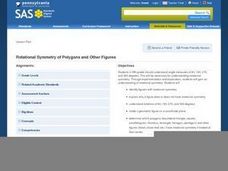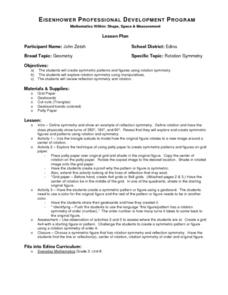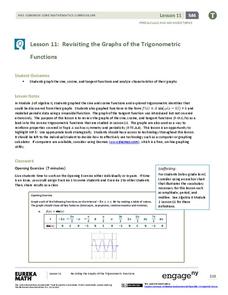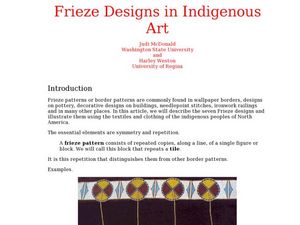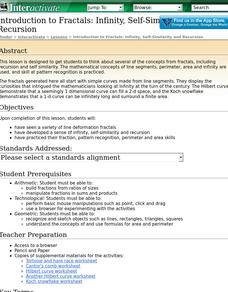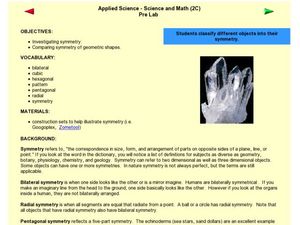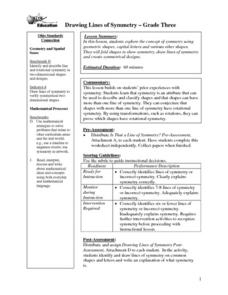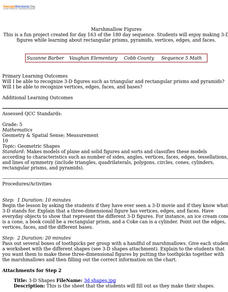Curated OER
Symmetry in Butterflies
Young scholars create a butterfly displaying a mirror image of itself to show that it is symmetrical. For this symmetry lesson plan, students go over symmetry in different shapes and identify patterns in butterflies.
Pennsylvania Department of Education
Rotational Symmetry of Polygons and Other Figures
Students explore geometry by participating in a shape rotation experiment. In this symmetry lesson, students identify the term symmetry and a list of other geometry vocabulary. Students analyze shapes as they are turned 90 degrees and...
Curated OER
Symmetry with Manipulatives
First graders investigate symmetry in patterns by utilizing unifix cubes. In this pattern lesson plan, 1st graders practice creating patterns that are perfectly symmetrical no matter which way it's looked at. Students utilize...
Curated OER
Rotation Symmetry
Students investigate the concept of symmetry by using various examples and performing independent practice with scaffolding provided by the teacher. They review reflection symmetry and cover the new rotation symmetry using manipuatives.
Curated OER
Side by Side: Butterfly Wings and Symmetry
Learners observe butterfly images and then draw and paint their own design. They use this activity to explain symmetry.
Curated OER
Symmetrical Snowflakes
First graders, exploring lines of symmetry, follow directions to create a symmetrical snowflake from their own homemade icing. As a class, they discuss lines of symmetry and determine if specific shapes are symmetrical. After the lesson,...
Alabama Learning Exchange
Origami Geometry
Origami is an excellent way to combine Japanese culture, art, and geometric shapes into one engaging instructional activity! Scholars begin by listening to the story Sadako and the Thousand Paper Cranes and learn the origin of...
EngageNY
Revisiting the Graphs of the Trigonometric Functions
Use the graphs of the trigonometric functions to set the stage to inverse functions. The lesson reviews the graphs of the basic trigonometric functions and their transformations. Pupils use their knowledge of graphing functions to model...
Curated OER
A Different Point of View
Elementary schoolers utilize a pattern worksheet embedded in this plan to work on a deeper understanding of geometric concepts like symmetry and congruency. Since geometry is such a visual form of mathematics, this lesson should fit...
Curated OER
Folding Shapes; Are the Sides the Same?
Second graders explore geometry by experimenting with fold-ables. In this geometric shapes lesson, 2nd graders utilize cutout shapes from construction paper which they experiment with by folding. Students examine the symmetry and...
Curated OER
Transformation
Third graders investigate symmetry by reflecting objects in different angles. In this geometrical transformation lesson, 3rd graders define the terms translation, rotation and reflection in order to physically turn geometric...
Curated OER
Frieze Design in Indigenous Art
Students describe Frieze designs using the work of indigenous people. In this math lesson, students create 7 frieze designs using different patterns. They create one row of repeated art and repeat this 7 times over...
Curated OER
Introduction to Fractals: Infinity, Self-Similarity and Recursion.
This instructional activity introduces students to the ideas involved in understanding fractals. They develop a sense of infinity, self-similarity and recursion and
Curated OER
Symmetry
Sixth graders explore symmetry and discuss the difference between a rotation and reflection. Using hands-on activities, such as folding paper shapes, they discover how to find the lines of symmetry and symmetrical characteristics. As a...
Curated OER
Drawing Lines of Symmetry
Third graders explore the concept of symmetry using geometric shapes, capital letters and various other shapes. They fold shapes to show symmetry, draw lines of symmetry and create symmetrical designs.
Curated OER
Using Symmetry to Find the Vertex of a Parabola
Learners engage in a instructional activity that is about finding the vertex of a parabola while using symmetry. They use the symmetry to find out where the two lines meet. The line is displayed with the help of a graphing calculator....
Curated OER
Mira, Mira on the Wall: Reflections
Students investigate and perform reflections and symmetry. In this geometry lesson, students compare and contrast the relationship between reflections and symmetries.
Curated OER
Am I Seeing Double?
Students explore symmetrical design and lines of symmetry. In this fourth grade geometry lesson, students create their own symmetrical design and identify and label the lines of symmetry. Students use one design to create a...
Curated OER
Symmetry
Learners identify the different symmetry in polygons. In this geometry lesson, students identify line, rotational and point symmetry in different objects. They find the symmetry with 90% accuracy.
Curated OER
Reflections over Two Lines & Dilations
Students create reflections over two lines. For this reflections worksheet, students compare and contrast reflections over parallel and intersecting lines. They dilate figures and investigate the effect of the dilation using measurement...
John Lentine
Butterflies and Bugs
Symmetry, line, shape, art, and math are all connected through a fun hands-on craft. Included are instructions to a classic activity, where learners create butterflies to show symmetry in nature and then discuss symmetry in math. It is...
Curated OER
Absolute Value And Symmetry
Young scholars engage in a lesson that is concerned with the concepts of absolute value and symmetry. They define the meaning of absolute value and graph functions and study the corresponding line and its symmetry. The lesson includes...
Curated OER
Exponential Reflections
High Schoolers explore the concept of exponential reflections. They use their Ti-Nspire to reflect the natural logarithm function over the line y=x. Students repeat the process using different exponential functions using a slider.
Curated OER
Marshmallow Figures
Students enjoy making 3-D figures while learning about rectangular prisms, pyramids, vertices, edges, and faces. After a lecture/demo, students use marshmallows, toothpicks and a worksheet imbedded in this lesson to create 3 dimensional...

